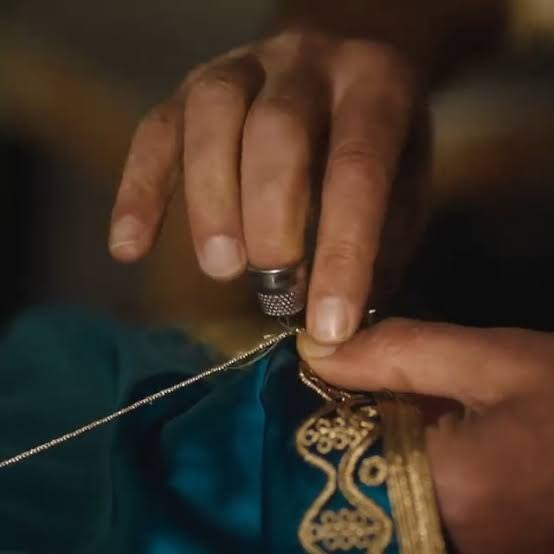Aleena Flack
The Blue Caftan (2022) directed by Maryam Touzani tells the story of a Moroccan couple running a hand-crafted tailoring business. Cinematographer, Virginie Surdej, does an incredible job capturing the intimate moments between Halim and his wife Mina, and each scene is carefully curated to reflect the mood of the characters—almost like an illustration. The film carries an overarching theme of earnest desire between Halim and his male work apprentice Youssef, hinting at Halim’s closeted bisexuality and leaving the audience to question the impact this will have on Halim’s marriage.
The vivid blue caftan—a traditional robe—as well as the title of the film, is a symbolic plot device; the creation of the caftan from scratch is a long-term project for Halim. He is focused on preserving his own culture—which could be interpreted as a subtle protest against the fast-fashion industry as hand-tailoring quietly disappears. The camera shots of Halim stitching the caftan together are intimately framed close-ups depicting a sewing needle pulling gold thread signifying Halim’s deep concentration and investment in his work.
The film’s dialogue is in Arabic, which settles viewers firmly in the setting of Morocco, where there are strict anti-LGBTQ+ laws. This forces Halim to keep his sexuality a secret, both out of shame and for him and his lover’s safety. The storyline is very similar to Touzani’s first feature film Adam (2019), which was also set in Morocco and spoken in Arabic. This film follows the journey of young woman Samia, unwed and pregnant in a time when this was illegal in Morocco. A baker named Abla allows Samia to stay at the bakery in exchange for her labour. Both these films portray characters who overcome adversity in traditional cultural settings where they experience marginalisation.
The Blue Caftan (2022) will be showing at the UWA Somerville Auditorium from the 20th March–26th March in the 7.30 p.m. timeslot as a part of Lotterywest Films (Perth Festival), and at Luna Leederville from Thursday March 30.
4 out of 5 Pelicans.

